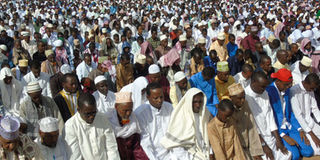Idd holiday should not be an ambush

Hundreds of Garissa residents turn up for celebration of Idd-ul-Fitr to mark end of Ramadhan on June 25, 2017 PHOTO | FILE | NATION MEDIA GROUP
What you need to know:
- Many Kenyans — both Muslims and non-Muslims — continue to face questions of knowing the exact day of the Idd-ul-Fitr public holiday.
- It has been a common trend to have the official Idd holiday being gazetted a few days before the end of Ramadhan.
- With the sudden announcements, the calendars of the government and the private sector are mired in confusion as key events are abruptly cancelled.
The Islamic calendar is quite different from the conventional Gregorian one. Islamic months either end with 29 or 30 days, depending on the sighting of the moon.
This has been a challenge when it comes to the declaration of Islamic holidays, especially where Muslims are a minority.
Many Kenyans — both Muslims and non-Muslims — continue to face questions of knowing the exact day of the Idd-ul-Fitr public holiday.
It has been a common trend to have the official Idd holiday being gazetted a few days before the end of Ramadhan.
The delay has led to serious inconveniences to not only Muslims but even non-Muslims. With the sudden announcements, the calendars of the government and the private sector are mired in confusion as key events and meetings are abruptly cancelled.
School examination timetables are also affected due to the ad hoc announcement. If a prior alert was given, such situations would not have occurred.
With proper arrangements in place, Kenyans would know the exact day of the Idd public holiday three weeks before the end of Ramadhan.
PUBLIC HOLIDAYS ACT
According to the Public Holidays Act, Idd-ul-Fitr is marked on the 31st day after the beginning of Ramadhan.
Based on a simple arithmetic, within the first two days of fasting, the Chief Kadhi is in a position to know the exact day for Idd-ul-Fitr, giving him enough time to coordinate with the government in the declaration of the public holiday.
This can easily be done, and it is just a matter of proper and early coordination between the authorities and the Chief Kadhi. The approach, if adopted by both the Chief Kadhi and the government, will make the Idd holiday enjoyable and free from any inconvenience for both Muslims and non-Muslims.
The government also need to pay attention to the persistent calls from Muslims to have the Idd-ul-Adha holiday declared a national public holiday.
Unlike the Idd-ul-Fitr holiday, Idd-ul-Adha — the other most important religious festival for Muslims, which is marked at the end of the Hajj pilgrimage — is recognised in the Act as a public holiday "only for Muslims".
RELIGIOUS OBLIGATIONS
This procedure does not serve Muslims well. For the lucky employees, they are forced to attend Idd prayers and rush back to the workplace while, for others, they have to sacrifice their religious obligations and report to work. Students sitting exams are compelled to forgo the all-important Idd prayers if they have a test that day.
For the first time in the country, the event was declared a public holiday in 2007 by former President Mwai Kibaki with a promise that this will be followed up with a national public holiday. This was not to be.
Last year, the late Interior Cabinet Secretary, Joseph Nkaissery, warmed the hearts of Muslims when he also declared the event a public holiday and the expectations that this would be a step forward in the eventual promulgation of Idd-ul-Adha as a public holiday have since waned.
LABORIOUS TASK
Muslims form a significant population in the country and it is imperative that the government follows up on this matter and grants Muslims an additional day to allow the faithful to observe and share the joys and happiness of Idd with their families, non-Muslim neighbours and compatriots.
In the eastern African region, it is only Kenya which is yet to recognise this event — the most important day in the Muslim calendar — and it should not be a laborious task for the government to declare Idd-ul-Adha a national public holiday.
Mr Abusufian is the head of media at Jamia Mosque, Nairobi. [email protected]





